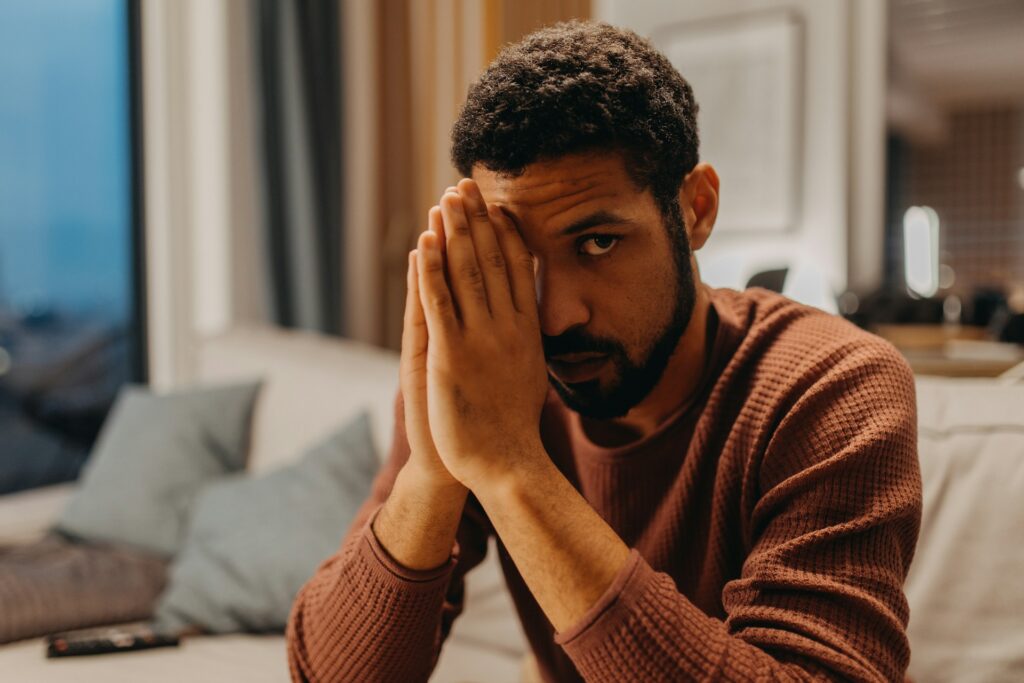Doing the right thing doesn’t always feel good—in fact, sometimes it feels completely awful.

Walking away from something familiar, saying no when you used to say yes, choosing yourself instead of keeping the peace—it can leave you full of doubt even when you know, deep down, it’s what needed to happen. Trusting yourself in those moments isn’t about always feeling confident. It’s about sticking with your truth, even when it’s uncomfortable, messy, or lonely. Here’s how to hold onto that trust when the right thing feels anything but easy.
1. Stop expecting clarity to feel comfortable.

We tend to think that once we figure out the right decision, we’ll feel calm or at peace. Of course, sometimes clarity still hurts. Choosing something that aligns with your values might mean losing things you care about, letting people down, or changing your life in a way that doesn’t feel simple. That doesn’t mean you’re making the wrong choice. It just means you’re human. Discomfort doesn’t cancel out truth. It’s possible to feel sure and still feel heartbroken at the same time.
2. Listen to the quiet voice, not the loud panic.

When you’re making a hard decision, your fear will scream. It’ll tell you that you’re being dramatic, selfish, or irresponsible. That’s just your nervous system trying to keep you in familiar territory, even if that place wasn’t working for you.
But beneath the panic, there’s usually a quieter voice. The one that’s steady, not frantic. The one that knows what’s true for you. Tuning into that voice takes practice, but it’s the one worth listening to, even if it doesn’t always feel reassuring right away.
3. Stop waiting to be 100% sure.

If you wait until you feel zero fear or hesitation, you’ll probably stay stuck forever. Trusting yourself doesn’t mean never doubting. It means acting anyway, even if your voice shakes or your brain won’t stop running in circles. You can make a decision from a place of self-respect and still second-guess it later. That’s not failure; that’s what growth feels like in real time. You’re allowed to move forward, even with doubt sitting in the passenger seat.
4. Let your body weigh in.

Sometimes your thoughts will lie to you. They’ll loop through guilt, over-explaining, and worst-case scenarios. However, your body often knows the truth first. If you feel a sense of deep relief, even under the sadness or stress, that’s worth paying attention to.
When something isn’t right for you anymore, your body reacts. You get tense. You avoid. You feel drained. Trusting those signals, even when your mind is still debating, can help you stay connected to what’s actually right for you, not just what’s familiar.
5. Remind yourself that pain and wrong aren’t the same.

It’s easy to confuse emotional pain with making a mistake. Of course, something can hurt and still be the healthiest thing you could’ve done. Leaving a job, setting a boundary, ending a relationship—these choices often come with grief, not because they’re wrong, but because they matter. If you’re feeling pain, it doesn’t mean you messed up. It means you’re doing something real. Something that requires courage and clarity. That deserves respect, not regret.
6. Give yourself a break from trying to justify everything.

One of the quickest ways to lose trust in yourself is to keep looking for external permission. You don’t need to explain your choices in ten different ways to make them valid. If something wasn’t working for you, that’s enough. You’re allowed to act on what’s best for you, even if it doesn’t make sense to everyone else. Trying to explain it over and over just pulls you further away from your own knowing. Let it be valid because you felt it was.
7. Stop grading your healing by how fast you bounce back.

Making a hard decision can knock the wind out of you. You might cry, miss what you left, or doubt yourself for days. That doesn’t mean you’re weak; it means you’re going through something real. Give yourself time to adjust. Trust doesn’t always feel strong right away. Sometimes it’s quiet and shaky at first. But staying with it, instead of rushing to “get over it,” is how that trust gets stronger.
8. Let it be messy.

There’s no clean, tidy version of change. Sometimes you’ll feel strong one minute and full of doubt the next. You might make a choice and then question it three times before lunch. That doesn’t mean you’re lost, you know. It means you’re human. The process of trusting yourself isn’t a straight line. It’s made up of brave moments followed by deep breaths. The key isn’t doing it perfectly—it’s not giving up on yourself in the messy middle.
9. Look back at what you’ve already survived.

When you’re in the middle of a tough call, it’s easy to forget how much you’ve already navigated. But chances are, you’ve been here before. You’ve had moments where you weren’t sure what to do., and you figured it out. You made it through. That matters. That history is proof that you can trust yourself to choose, to adapt, and to keep going. Even if this situation feels new or bigger, you’re not starting from scratch. You’re building on experience you already have.
10. Talk to yourself like someone you care about.

We’re often way harsher with ourselves than we’d ever be with someone else. If a friend were going through the same thing, you’d probably remind them of their strength, their reasons, and their right to choose what’s best for them.
Try saying those same things to yourself. Not in a cheesy way—just in a real, solid way. If you wouldn’t call someone else a failure for feeling unsure, don’t do it to yourself. That kind of inner kindness builds trust faster than any pep talk ever could.
11. Stop expecting the hard choice to feel instantly rewarding.

We’re sold this idea that once we do the brave thing, we’ll feel amazing—and sometimes we do. However, often, it takes time. The relief doesn’t always hit right away. In fact, it might feel worse before it feels better. That doesn’t mean you chose wrong—it just means you’re in the in-between. Give it time. Let the benefits unfold gradually. Trust isn’t a rush of confidence. It’s a quiet knowing that you did what you needed to, even if your heart still stings.
12. Let future you handle the next part.

You don’t have to have everything figured out right now. Maybe the next steps are still foggy. Maybe you only know what needed to end, not what comes next. That’s okay. Part of trusting yourself is knowing that you’ll show up again tomorrow, even if you don’t have the full plan.
You don’t need to solve the whole puzzle today. Just make the choice that feels right in this moment. Future you is stronger than you think, and they’ll know what to do when it’s time. For now, staying honest is enough.


